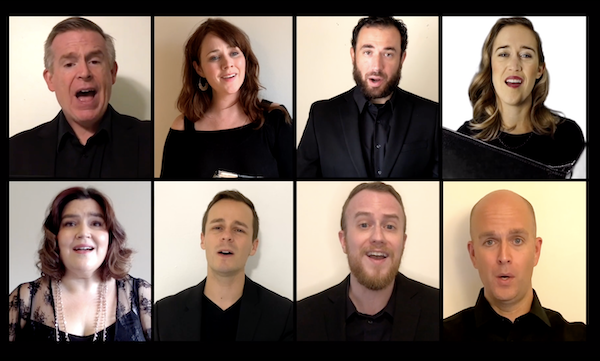Seraphic Fire serves the eye and ear with season-opening video

As musical organizations turn to streaming as a way to connect with audiences in this difficult time of pandemic, new formats are being developed.
On Sunday afternoon Seraphic Fire, Miami’s top-tier choral ensemble, presented “Still. Here. Music of Love and Plague,” an eye-filling video combining vocal and instrumental selections with period art and poetry. The 45-minute program encompassed the cultural milieu of the 14th through 16th centuries, the era of continual plagues and the Black Death.
Rather than his accustomed role as the choir’s conductor, artistic director Patrick Quigley was the program’s producer. Each of the 13 singers and 3 instrumentalists recorded their parts separately at their homes across the United States from Miami to California and even across the ocean in London.
Between musical offerings, longtime Seraphic Fire members Margot Rood and Reginald Mobley recited poetry by Alice Moore Dunbar Nelson, Elizabeth Barrett Browning, Alfred De Musset, Sir Thomas Wyatt, George Herbert, Paul Laurence Dunbar, Emily Dickinson, Shakespeare and Pushkin. This hybrid production proved at once moving, gripping and entrancing. Itv also served as a timely reminder that the world has experienced widespread, devastating epidemics of disease before and managed to survive with its culture intact.
The medieval Gregorian chant Stella caeli extirpavit set the mood as Kyle Ferrill’s firm bass introduced a male choir in this desperate plea for life. Spare vocal lines rose to the final pronouncement “save us, Prime God.”
Concentrating on Tudor England around the reign of Henry VIII, the film’s first half continued with tenors Brad Diamond and Patrick Muehleise melding to winning effect in the simple, rollicking tune of William Cornysh’s “Ah, Robin.” Molly Quinn’s clear high soprano dominated “Pastime with company,” a robust song attributed to Henry VII himself. The accompanying chorus and percussion added rhythmic impetus.
Venice and Rome became the center of the program’s second half with lutenist John Lenti providing elegant French dance interlude of Branle and Gaillarde by Pierre Attaingnant. The plaintive strains of Super flumina Babylons by Giovanni Palestrina emerged in smoothly blended choral tones. Palestrina’s beautiful Sicut cervus flowed with similarly silken grace.
Yet here despite the vocalists’ skillful delivery, some of the balances seemed slightly off. This was perhaps inevitable in the absence of a conductor to make adjustments. (In this work, all of the singers were finally shown on screen.)
Claudio Monteverdi’s Lamento della ninfa is a scena by the father of opera, a lament by a woman whose lover has betrayed her. Nolah Richardson has been one of this group’s most stellar singers of recent seasons. Shew projected the heroine’s anguish with tremendous warmth of sound and expression, enhanced by the film of a pastoral setting and the sonorous male vocal contingent. This dramatic musico-dramatic mini-cantata was definitely the concert’s high point.
Tudor England under Elizabeth I was the setting for the final segment. Lenti introduced the more upbeat selections with Wilson’s Wilde and A Toy, traditional dances embellished with patrician musicianship. John Dowland’s
“Come again, sweet love” has long been a staple on vocal recital programs. Usually sung by a soprano, mezzo Luthien Brackett’s lower range brought greater urgency to this charming melody. Filmed against a castle-like setting, Brackett’s mellow rendition was beautifully integrated with the chorus, bringing great musicality to an often-heard gem. “The Poor People’s Complaynt” sounded a familiar protest against income inequality, set to the lilting traditional melody Light O’ Love. Sara Guttenberg combined the immediacy of a folk singer with the finely honed skills of a classical soprano.
The production concluded on a more spiritual note with “Never weather-beaten sail” by Thomas Campion. Steven Soph’s pure lyric tenor did solo honors in the silvery-toned choral performance. In addition to Lenti, Justin Blackwell on keyboard and Rhett Del Campo on percussion brought strong musicality to the accompanied works. The outstanding video production and strong musical values of this offering bode well for Seraphic Fire’s scheduled season of virtual programs.
James K. Bass leads “Home for the Holidays,” Seraphic Fire’s annual Christmas program streamed on Vimeo 4 p.m. December 20. Seraphicfire.org
Posted in Performances
One Response to “Seraphic Fire serves the eye and ear with season-opening video”
Leave a Comment
Mon Nov 9, 2020
at 2:07 pm
1 Comment







Posted Nov 11, 2020 at 6:46 am by Peggy Dettwiler
Can’t open the file to listen!